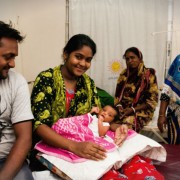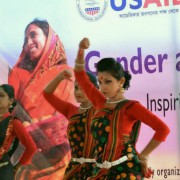The Inclusive Growth Study for Bangladesh provides analysis of the developments that have taken place for economic growth and poverty reduction over the past decade. By applying conventional growth diagnostic techniques, the paper identifies the main obstacles faced by investors that affect growth and inclusive growth in Bangladesh.

The United States Agency for International Development (USAID) and the United Kingdom’s Department for International Development (DFID) have joined together to make quality healthcare more widely available for poor families through the Smiling Sun network of health clinics.
Today marks the one-year anniversary of the building collapse at Rana Plaza in Dhaka, Bangladesh that claimed over 1,100 lives and injured thousands more – the worst industrial disaster in the history of the garment industry. Like the Triangle Shirtwaist disaster in the United States over one hundred years ago, Rana Plaza, and the Tazreen factory fire that preceded it in November 2012, have become potent symbols of the significant and unnecessary risks that many workers are still forced to take in order to earn a living and support their families. As we mourn the victims, we are again called to action so that tragedies like Rana Plaza and Tazreen never happen again.

The United States Agency for International Development (USAID) and Begum Rokeya University, Rangpur concluded a joint three-day event dedicated to promoting women’s rights. Held from April 8-10, the Gender and Development Fair provided a platform for local leaders, university students, and the people of Rangpur to commemorate the economic and social contributions of women in Bangladesh.
We must continue to work together to ensure all Bangladeshis have healthy, empowered lives. Boys and girls treated for pneumonia or diarrhea have the potential to grow into healthy and productive men and women, poets and presidents, scientists and doctors, and responsible fathers and mothers. To realize this vision, boys and girls in Bangladesh, we must protect them from easily preventable diseases and conditions that rarely take a child’s life in wealthier countries.








Comment
Make a general inquiry or suggest an improvement.